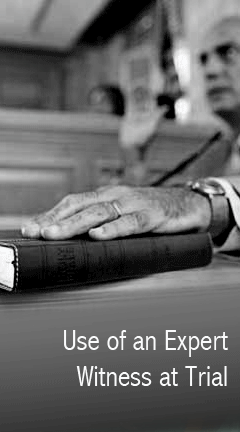Archival Notice
This is an archive page that is no longer being updated. It may contain outdated information and links may no longer function as originally intended.
Home | Glossary | Resources | Help | Course Map
Expert Opinion Testimony
The expert plays a special function in the trial process. The forensic analyst's right to testify is based on the need of the fact finder for some specialized knowledge beyond that of the average juror.
The general standard for expert testimony is whether "scientific, technical or other specialized knowledge will help the trier of fact to understand the evidence or to determine a fact in issue" (FRE 702). If the fact finders (usually jurors but, in some cases, judges) already have the basic knowledge at issue, there is no need for an expert to testify in that capacity.
Once the above standard is met, it must be shown that the particular expert is qualified. Qualifications may come from a variety of sources: "by knowledge, skill, experience, training, or education" (FRE 702).
Additional Online Courses
- What Every First Responding Officer Should Know About DNA Evidence
- Collecting DNA Evidence at Property Crime Scenes
- DNA – A Prosecutor’s Practice Notebook
- Crime Scene and DNA Basics
- Laboratory Safety Programs
- DNA Amplification
- Population Genetics and Statistics
- Non-STR DNA Markers: SNPs, Y-STRs, LCN and mtDNA
- Firearms Examiner Training
- Forensic DNA Education for Law Enforcement Decisionmakers
- What Every Investigator and Evidence Technician Should Know About DNA Evidence
- Principles of Forensic DNA for Officers of the Court
- Law 101: Legal Guide for the Forensic Expert
- Laboratory Orientation and Testing of Body Fluids and Tissues
- DNA Extraction and Quantitation
- STR Data Analysis and Interpretation
- Communication Skills, Report Writing, and Courtroom Testimony
- Español for Law Enforcement
- Amplified DNA Product Separation for Forensic Analysts


